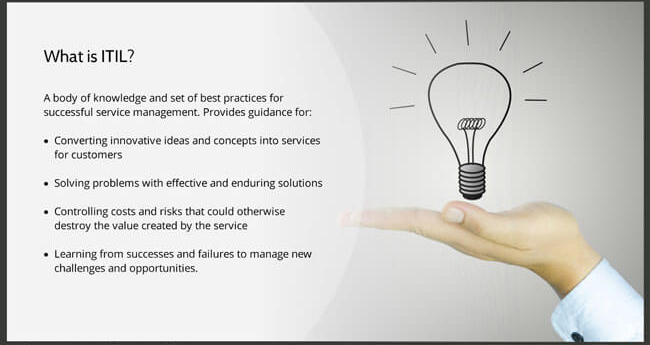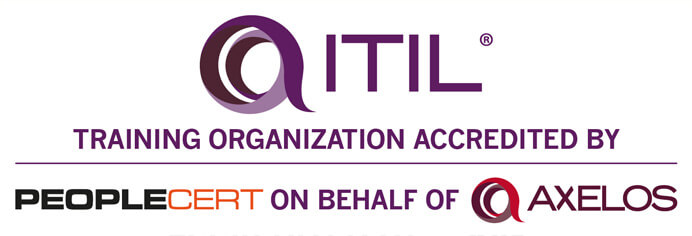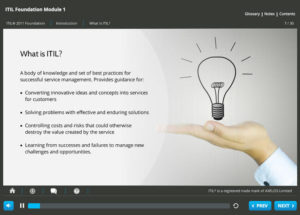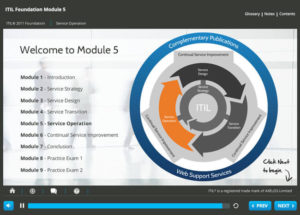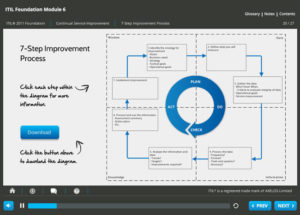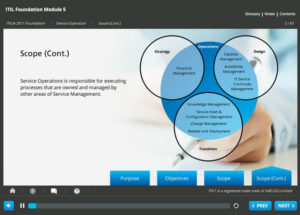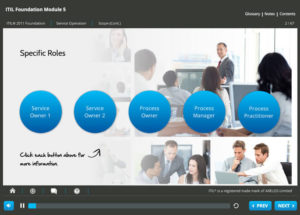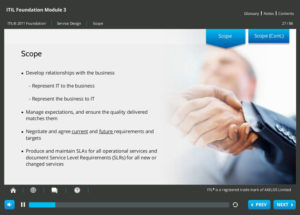E-learning ITIL® FOUNDATION
Study for ITIL Certification at Foundation Level by taking an online training course with 4PA !
The course is ideal for professionals who work within an organization that has implemented ITIL as part of an ongoing service improvement program.
This course is accredited by PeopleCert, who are licensed by AXELOS as an Examination Institute for the ITIL Foundation Certificate in IT Service Management.
Why you Should Take This Course:
ITIL Foundation is an important, entry-level qualification for participants who want to become knowledgeable about the core elements of the ITIL Framework.
The course gives an overview of the ITIL Framework which is captured in the 5 core ITIL volumes of Service Strategy, Service Design, Service Transition, Service Operation and Continual Service Improvement (2011 versions).
Our course uses interactive technology, high quality media and downloadable resources to teach the key elements, principles and processes of the 5-stage ITIL Service Lifecycle and as such, is fully accredited by PeopleCert, who are licensed by AXELOS as an Examination Institute for the ITIL Foundation Certificate in IT Service Management.
Browse the course syllabus for a full module by module breakdown of what’s included.
With this course, you’ll receive 6 months access as well as FREE exam voucher to use within 6 months of courses access. Just contact us when you are ready to sit the exams!

The objectives of this foundation course in IT service management are to enable you to understand the importance of service management, both to the IT service provider, and to it’s customers.
Participants will also be introduced to the service lifecycle, it’s processes, and the functions which carry out those processes.
Specifically, it shows how the ITIL best practice framework can be used to improve the quality, effectiveness and efficiency of service management in every type of organization.
Our course has been accredited by PeopleCert, who are licensed by AXELOS as an Examination Institute for IT Service Management.
Why Study ITIL Foundation with 4PA?
4PA is :
- A Leading Training & Consulting Organization
- Accredited by various principals
- World-wide presence and delivery models
- Unique, but proven,knowledge transfer and validation techniques
- Adds great value to the Organizations
- Result oriented approach
The Benefits of eLearning:
All 4PA courses run entirely over the web and have been carefully designed to provide the most comprehensive, interactive and flexible learning experience available. Study when it suits you – at home, at work or on the move.
Flexibility to learn from your desktop, laptop or tablet at your own pace, when it suits YOU. Anytime. Anywhere (an internet connection is required).
Our courses are easy-to-use. Participants will benefit from an interactive multimedia environment that enhances the way you study.
With eLearning, individuals and organizations avoid the typical costs of travel and consultancy by studying independently online.Our online training courses are designed with mobility and accessibility in mind. You can access your training from any desktop computer, laptop, tablet, or mobile phone.
ITIL is the result of the UK government’s Cabinet Office documenting a set of processes and procedures for the delivery and support of high quality IT services, designed and managed to meet the needs of an organization.
ITIL can be adopted by an organization and adapted to meet its specific needs.
By completing this ITIL Foundation course, you will gain an understanding of the importance of service management, both to the IT service provider, and to its customers.
Specifically, you will understand how the ITIL best practice framework can be used to improve the quality, effectiveness and efficiency of service management in every type of organization.
Why Adopt ITIL for Your Organization?
The main reason for its continued adoption is that it is based on a practical approach to service management, utilizing what actually works in real organizations. The guiding principle behind this is to ensure that all efforts are engaged in a common goal, to deliver IT services that support the requirements of the business, by delivering value to the organization.
ITIL will enable you utilize and implement IT service and capabilities to provide and maximize value within your organization. By adopting the method and service within ITIL will increase productivity, optimize costs and improve customer experience.
ITIL (Information Technology Infrastructure Library) is a body of knowledge and set of best practices for successful IT service management. It provides guidance for:
Converting innovative ideas and concepts into services for customers
Solving problems with effective and enduring solutions
Controlling costs and risks that could otherwise destroy the value created by the service
Learning from successes and failures to manage new challenges and opportunities
This eLearning course contains all the learning materials you need in order to prepare for the ITIL Foundation exam.
Our course has been accredited by PeopleCert, who are licensed by AXELOS as an Examination Institute for IT Service Management and provides an introduction to the Service Lifecycle and will prepares you to pass the Foundation (2011) exam
Full Details of our ITIL Foundation Course:
Browse the contents of this eLearning course by clicking on a module title below that you would like to know more about. Why not try a free trial module of our course before you buy!
Module 1: An Introduction to IT Service Management
The objectives of this foundation course in service management are to enable participants to understand the importance of service management, both to the IT service provider, and to their customers.
Specifically, we show how the ITIL best practice framework can be used to improve the quality, effectiveness and efficiency of service management in every type of organization.
Service Lifecycle
This module looks at the purpose, objective and scope of this phase of the lifecycle; we consider its value to the business and consider how services can deliver value. We then consider 3 of the service strategy processes and their purpose, objectives and scope. These processes are:
Service Portfolio Management
Financial Management
Business Relationship ManagementModule 2: Service Strategy
The service strategy publication provides guidance on understanding the most important practices that need to be employed to define and carry out a service strategy in a service provider organization.
Providing an understanding of what strategy is
Identification of the services and the customers who use them
Understanding how to define value creation and delivery
Provision of the means to identify opportunities to provide services and how to make the best of them
Delivering a comprehensive and clear service provision model, in which we identify how the services will be funded and presented, and to whom they will be delivered and the purpose that they will serve
Understanding the organizational capability that will be required to deliver services according to the strategy
Coordinating and documenting the use of service assets for the provision of services, and how they can be used, including optimizing their performance
Defining the processes and services, which will deliver the strategy of the organization, and the level of investment that will be required. Understanding the levels of demand and how to establish a relationship between the service provider and the customerModule 3: Service Design
In the service design part of the course, we look at the Purpose, Objectives, Scope and business value of this lifecycle stage.
We examine what we call the 4 P’s – People, Processes, Products and Partners – the 4 areas we need to consider when designing a service. We then look at the 5 major aspects of Service Design. These are:
Designing the Service Solution itself
Designing the service management system and tools that will be required to manage the service
Understanding the importance of management and technology architectures
Understanding the processes that will be required
The measurement systems, methods and metrics that will show us whether the service is working properly or notModule 4: Service Transition
Service Transition consists of 7 different processes. We examine the purpose, objectives, scope and business value of this lifecycle stage, and look in detail at the Change Management process.
Transition planning and support
Knowledge Management
Service Asset and Configuration Management (SACM)
Release and Deployment ManagementModule 5: Service Operation
In this module we look at the Purpose, Objectives and Scope of Service Operation and the value it provides to the business.
We look in detail at the key processes of Incident management and Problem Management. We then take a high level view of the remaining 3 operations processes of access management, request fulfilment and event management.
Having considered the service operation processes, we move on to consider the ‘people’ aspects of this lifecycle stage.
The majority of IT staff is involved (to a greater or lesser extent) in the service operation stage. Although they may be involved in other lifecycle stages; their main focus is the delivery of the operational services.
In this module, we examine the four functions involved in service operations. These are the service desk, technical management, application management and operations management functions.
The Service Desk function will be considered in detail, whilst the Roles and objectives of the Technical, applications and operations management functions will be reviewed at a higher level.
Module 6: Continual Service Improvement
You can see the contents of this section on the screen, when you have completed this section you should be able to:
Account for the main purpose, objectives and scope of continual service improvement
Briefly explain what value continual service improvement provides to the business
Understand the purpose, objectives and scope for the seven-step improvement process
Explain the continual service improvement approach
Describe the CSI register and the Deming Cycle Understand the role of measurement for continual service improvement and types of metrics
Understand the relationship between critical success factors and key performance indicators and the importance of BaselinesModule 7: Conclusion
By completing this course, you will have gained an understanding of the importance of service management, both to the IT service provider, and to their customers.
Specifically you should now understand how the ITIL best practice framework can be used to improve the quality, effectiveness and efficiency of service management in every type of organization.
Certification scheme
Once you have passed your foundation exam, you may wish to continue your service management studies.
The qualifications do not expire – there is no requirement to renew them as with some schemes. There are 4 levels of ITIL qualification, shown here. Each exam earns you credits, to add to the 2 credits awarded for the foundation certification.
You may wish to move up through the levels to Expert or Master, or you may just want to increase your knowledge in a particular area. The scheme is designed to satisfy both approaches.
You can take as few or as many Intermediate qualifications as you require, and to suit your needs. The Intermediate modules go into more detail than the Foundation level, and these qualifications are recognized throughout the IT industry.
ITIL® is a registered trademark of AXELOS Limited.
Thinking of sitting the ITIL Foundation Exam? On this page, you will find everything you need to know!
In order to achieve this foundation qualification you must pass the ITIL® 2011 Foundation Certificate in IT Service Management exam.
You can take the exam online (virtually) using a service provided by PeopleCert.
When you have completed the learning outcomes of the course, you will be ready to start preparing for the ITIL Foundation exam. To support you with this, the eLearning course contains a practice exam that will simulate the conditions of the real thing.
What you Need to Know About the Exam:
This is a multiple choice exam consisting of 40 questions and there is a time limit of 60 minutes to complete the exam. The exam is closed book – you cannot make use of any resources or materials during the exam.
To pass the exam you must get 26 out of 40 questions correct (65%).
The course materials provided in the Foundation eLearning course will provide you with all the information you need for this exam. You will be tested on:
Service management as a practice (comprehension)
The ITIL service lifecycle (comprehension)
Generic concepts and definitions (awareness)
Key principles and models (comprehension)
Selected processes (awareness)
Selected functions (awareness)
Selected roles (awareness)
Technology and architecture (awareness)
Competence and training (awareness)
Before you book you can test that your computer configuration will meet the requirements for a PeopleCert exam, using this online test.
This test focuses on the suitability of your webcam, microphone and internet connection. Please Visit the PeopleCertwebsite for a complete list of information and guidance.
Why not try out a free trial module from our ITIL Foundation eLearning course!
In this ITIL Foundation trial module, you will learn the purpose, objectives, and scope of Service Design via a mixture of interactive and audio techniques to enhance the learning experience.
Our course has been fully accredited by PeopleCert, who are licensed by AXELOS as an Examination Institute for IT Service Management.
Try the Course Before you Buy!
Like the full ITIL Foundation eLearning course, you can access this free trial module from any device whether you are at home, at work, or on the move!
If you require any other information regarding the course or how to access the eLearning on a mobile device, please feel free to leave your details with us via our online contact form and a member of our team will be in touch.
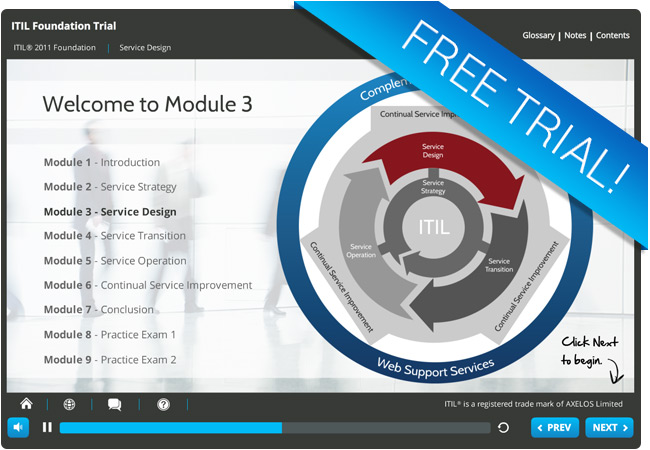
ITIL® and the The Swirl Logo™ are registered trade marks of AXELOS Ltd. Used and reporodued with the permission of AXELOS.


